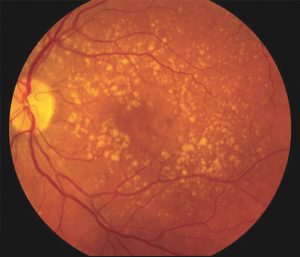By Dan P. Montzka, M.D.
 Age-related macular degeneration (AMD) remains a prevalent concern for individuals over 50, affecting their vision and quality of life. This progressive eye condition gradually damages the macula, the central portion of the retina, leading to blurred or distorted vision and, in severe cases, vision loss. The impact of AMD on daily life can be profound, affecting activities like reading, driving, and recognizing faces.
Age-related macular degeneration (AMD) remains a prevalent concern for individuals over 50, affecting their vision and quality of life. This progressive eye condition gradually damages the macula, the central portion of the retina, leading to blurred or distorted vision and, in severe cases, vision loss. The impact of AMD on daily life can be profound, affecting activities like reading, driving, and recognizing faces.
However, in recent years, significant advancements in treatment options have sparked hope for those grappling with AMD. Traditional treatments, such as anti-VEGF injections, remain crucial in managing AMD. These injections target the abnormal blood vessel growth that characterizes the more severe form of the disease, known as “wet” AMD. They have been successful in slowing down vision loss and, in some cases, even restoring vision.
Yet, the landscape of AMD treatments is evolving rapidly, offering new avenues beyond the conventional approaches. One such promising development involves the use of gene therapy. This cutting-edge treatment aims to address the underlying genetic factors contributing to AMD, potentially offering more targeted and long-term solutions.
Another groundbreaking area is stem cell therapy. While still in the experimental stage, researchers are exploring the potential of stem cells to replace damaged cells in the retina, thereby restoring vision. Although this avenue requires further extensive research, it holds immense promise for revolutionizing AMD treatment in the future.
Furthermore, innovative drug therapies are under investigation to supplement or even replace current treatments. These therapies focus on different aspects of the disease, such as inflammation or oxidative stress, offering a multi-pronged approach to combating AMD and potentially reducing the frequency of invasive treatments.
In addition to these medical interventions, lifestyle modifications and nutritional supplements are gaining attention for their role in managing AMD progression. A diet rich in antioxidants, omega-3 fatty acids, and specific vitamins and minerals has been associated with a reduced risk of AMD advancement. Furthermore, lifestyle changes like quitting smoking, maintaining a healthy weight, and protecting the eyes from harmful UV rays may contribute to slowing the disease’s progression.
While these advancements are promising, it’s important to note that not all treatments might be suitable for everyone, and their effectiveness can vary from person to person. Consulting with an eye care professional is crucial for proper diagnosis and personalized treatment plans.
Moreover, the cost and accessibility of these emerging treatments remain important considerations. As these innovative therapies continue to evolve, ensuring their availability and affordability to a broader population becomes a significant concern for healthcare systems worldwide.
In conclusion, the landscape of AMD treatment is witnessing a remarkable transformation, offering newfound hope for individuals over 50 facing this debilitating condition. From gene therapy and stem cell research to innovative drug therapies and lifestyle modifications, the spectrum of options for managing AMD is expanding. While these advancements hold immense promise, continued research, accessibility, and personalized care are essential to harness the full potential of these emerging treatments and improve the lives of those affected by AMD.
Dan P. Montzka, M.D. is a board-certified ophthalmologist, specializes in diseases of the vitreous and retina. His area of sub-specialty includes the medical and surgical management of diabetic retinopathy, macular degeneration, retinal detachments and complications of intraocular surgery.
Dr. Montzka received his bachelor’s degree with honors in Chemical Engineering from the University of Minnesota, Institute of Technology in 1985. He graduated from the University of Pennsylvania School of Medicine in 1989, receiving the Charles A. Oliver award for outstanding achievement in the field of Ophthalmology. After serving his ophthalmology residency at the Scheie Eye Institute in Philadelphia, Dr. Montzka completed his fellowship training in retina and intraocular tumors at the Wills Eye Hospital in Philadelphia.
Dr. Montzka has authored numerous papers on retinal vascular disease and retinal electrophysiology. He edited the popular Wills Eye Hospital Atlas of Clinical Ophthalmology on CD-ROM and served as the medical consultant on the classic ophthalmology reference Duane’s Clinical Ophthalmology on CD-ROM. Dr. Montzka has developed his own electronic medical software for use in his practice. In April 2001, he earned a United States Patent for the apparatus, system and method for securing scleral tissue during certain forms of retina surgery.
Dr. Montzka maintains an active interest in the latest research and treatment of retinal disease. He recently served as an investigator for the Visudyne Photodynamic Therapy Study and Rheopheresis Clinical Trial.
Retina Group of Florida
If you are experiencing any changes in your eye health, whether it is blurry vision, pain, impaired vision, or any other visual irregularities, you should see an ophthalmologist right away. The earlier a disease is detected, the better the outcome and treatment options are for you. You will find a friendly and warm environment at Retina Group of Florida.
Please call (352) 419-8928 today to schedule your eye exam. When necessary same day appointments can often be accommodated.
Dan P. Montzka, M.D.
212 South Apopka Avenue
Inverness, Florida 34452
352-419-8928
retinagroupflorida.com
 Central Florida Health and Wellness Magazine Health and Wellness Articles of the Villages
Central Florida Health and Wellness Magazine Health and Wellness Articles of the Villages



